As the world still celebrates William Shakespeare’s birth and death day each year, the playwright’s immortal relevance is clear. Among countless reinterpretations of Shakespeare’s life and work, BBC’s sitcom Upstart Crow is a surprisingly fitting way to reinvent Shakespearean comedy.
Another year, another Shakespeare day. Having just passed the Bard’s joint birthday and death day (April 23) again, it’s become a tradition here at The Mindful Rambler to feature an interpretation of William Shakespeare’s life and career.
This year, I’ve been watching BBC’s Upstart Crow during lockdown. The Shakespeare-themed sitcom was created and written by Ben Elton, of Blackadder fame. I watched the historical comedy show Blackadder growing up and I’ve been meaning to write about it for ages … I’ll get there eventually. In the meantime, let’s talk about Upstart Crow and why Shakespeare is an ideal (albeit unlikely) sitcom star.
It’s true – Shakespeare’s continued relevance and success make his life and works the perfect topic for a sitcom. His comedies and their signature plot devices lend themselves well to the modern-day sitcom genre.
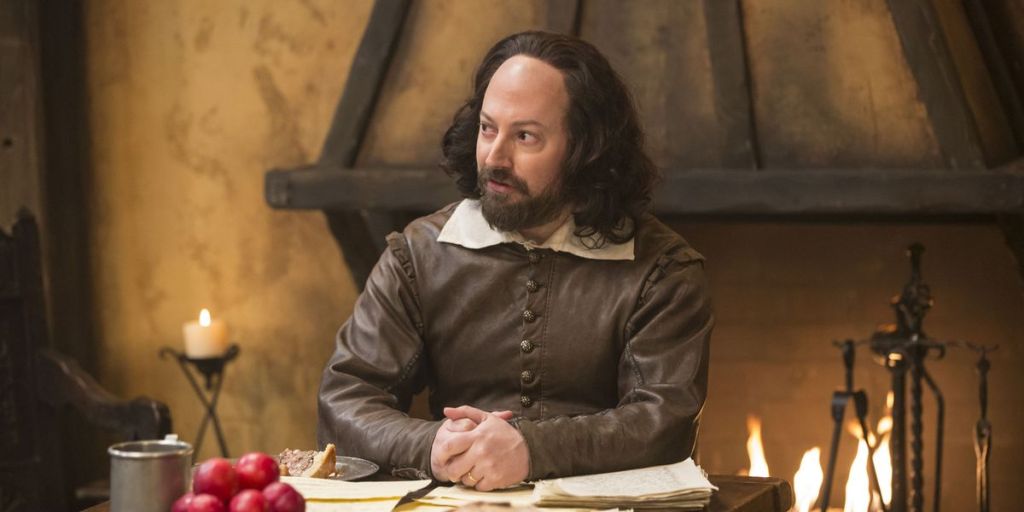
Upstart Crow takes place alternately between London and Stratford-upon-Avon, Shakespeare’s hometown. In the late 16th century a more or less middle-aged Shakespeare (played by David Mitchell) is an established playwright, travelling back and forth between his Stratford homestead and his lodgings in London – where, of course, all the best playhouses are at the time. The biographical details of the show are hazy, a reminder that Upstart Crow is ahistorical in its approach – it plays with Shakespeare’s life.
For instance, although the real Shakespeare’s relationship with his wife Anne Hathaway is still debated (Did they love each other? Was he snubbing her in his will, or honouring her?), Upstart Crow treats us to a warm and fuzzy family dynamic with plenty of banter between Shakespeare and his wife, children, and parents. The show’s style unites Shakespeare’s well-known stories with modern-day comedy conventions, veiling current pop culture references behind Elizabethan social mores. In a way, the sitcom is both a product of Shakespeare’s time and ours – as a genre, it’s strangely fitting for the playwright’s quirky style.
The series boasts an abundance of Shakespeare references for fans of the Bard, while delivering a well-written sitcom in its own right. In many ways, we can actually read Shakespeare’s comedy plays as precursors to the sitcom as we know it today. Many of Shakespeare’s comedic plotlines have the makings of a situational comedy, whether it’s misunderstandings, disguises, marriage proposals both failed and successful… you get the picture. Elton takes advantage of Shakespeare’s hilarious gags to create premises for Upstart Crow episodes.
Not only that, but the show also subverts Shakespeare’s tragedies, making them into ridiculous scenarios to round out the series with works from across Shakespeare’s bibliography. Even the sonnets are touched upon, regarding the Earl of Southampton, who has long been rumoured to have been Shakespeare’s man-crush (crush? who knows). The popular theory of Christopher Marlowe having written Shakespeare’s plays is delightfully turned on its head, with Shakespeare producing work for an indolent yet charming Kit (who was actually a successful playwright before Shakespeare, despite their being born in the same year).
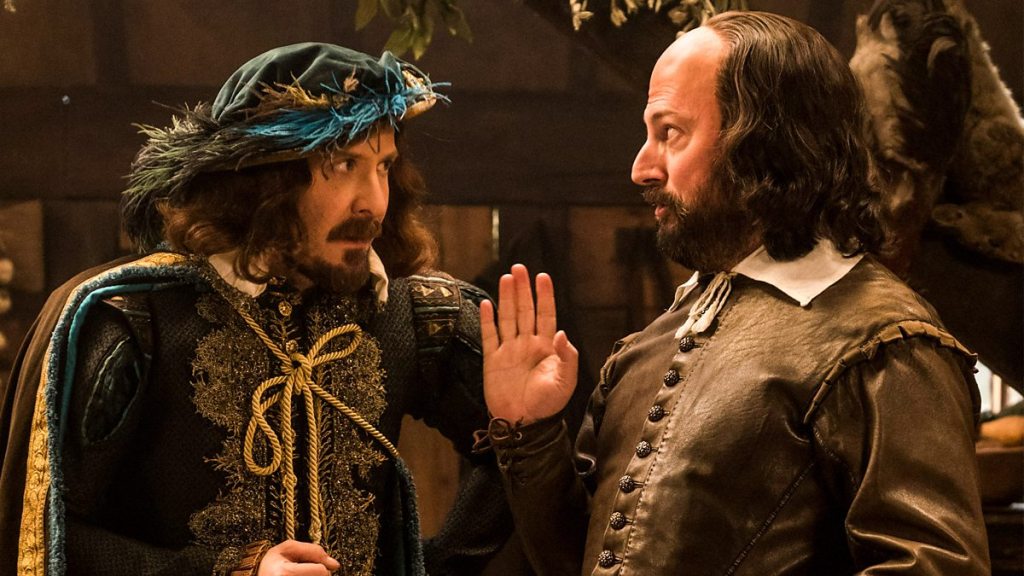
The show’s subversions bring Shakespeare into a liminal place, an alternate universe of sorts. Upstart Crow doesn’t pursue accuracy, which isn’t technically necessary for good storytelling anyway. The show’s cheeky tone and good pacing make for sound storytelling. There are running jokes about Shakespeare stealing other people’s ideas, and rants about Elizabethan-era transport – anyone who’s taken the tube (the London Underground) or any public transit can relate. Upstart Crow is littered with similar tongue-in-cheek references to present-day pop culture amid the Elizabethan wisecracks. There was even a plague-themed lockdown Christmas special last year in response to the COVID-19 pandemic, featuring a fifteenth wave of quarantine (God forbid!).
It’s fascinating to see elements of our society given the Shakespearean treatment. However, Upstart Crow is at times too on-the-nose about social issues such as sexism and racism. I think viewers are meant to understand those gaffes as evidence of the “backwardness” of the time; however, the fact that a lot of those jokes go uncontested make them a bit gratuitous. It’s fairly obvious that the tone is satirical, but at times some of the characters’ overreliance on reductive humour is jarring for a witty and upbeat comedy.
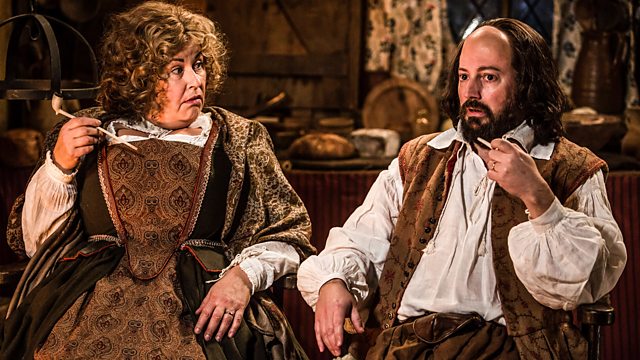
Nevertheless, that’s not to say that Upstart Crow lacks female characters with agency. Kate (Gemma Whelan), the daughter of Shakespeare’s landlady, is always on the scene to point out regressive themes and problematic elements of Shakespeare’s drafts, her strong moral compass no doubt mirroring the views of many of us who watch. Kate is an excellent bridge from the modern viewer to Elizabethan times, and she often grounds the episodes in a present-day context. Shakespeare’s daughter Susanna is also outspoken, and her bold, sometimes rough manner undercuts the confining idealization of women’s innocence in Elizabethan times.
Finally, Shakespeare’s wife Anne (Liza Tarbuck) is credited with many of the brilliant plot ideas in Shakespeare’s plays: each episode ends with Shakespeare and Anne smoking by the fire in their Stratford home, reflecting on recent events. Anne tosses out insightful suggestions every time; from our knowledge of his plays it’s implied that Shakespeare goes on to use her ideas, riffing on the concept of a woman’s ingenuity being repackaged and sold by a man (often to his benefit) in a patriarchal society. Upstart Crow therefore asserts that Anne is responsible for most of her husband’s iconic storylines and titles. The show doesn’t often slow down long enough to ruminate on the social tensions I’ve illustrated here, as the action trots along at a sprightly pace – but hints of contemporary awareness are definitely present, however they come across.
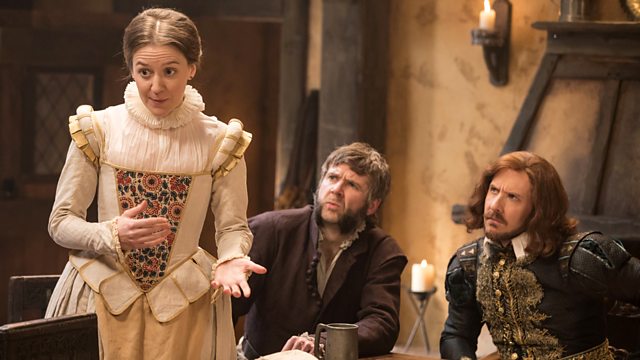
To really achieve a lively Shakespeare adaptation, one must include copious Shakespearean insults, something Upstart Crow excels at. In fact, the show itself is named after an insult from a real-life rival poet, Robert Greene, who published a pamphlet in 1592 deriding Shakespeare as “an upstart crow” – referring to his middle-class birth. Greene (Mark Heap) appears as the show’s snobbish villain, devising dastardly schemes to humiliate Shakespeare – many of which come straight from the Shakespeare canon. For instance, Greene convinces Shakespeare to wear yellow stockings to a high-profile London ball, à la Malvolio in Twelfth Night.
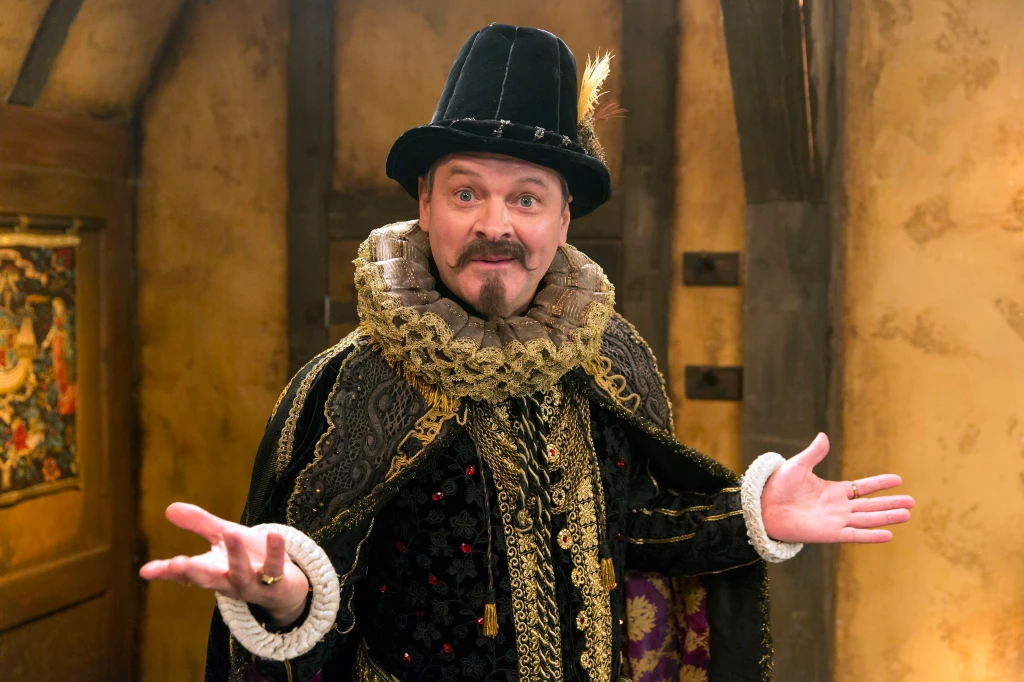
Greene’s antagonism aside, the real payoff of the show is seeing Shakespeare blast other characters with streams of clever insults, slightly modernized but no less verbose. In creating his own inventive barbs, Ben Elton twists the Bard’s talents of language to great comic effect. One such example, so you can get a taste for it: “Spurious unearned social status will polish even the most stinksome turdlingtons – by which, of course, I mean you, Dad.” Or, in Robert Greene’s supercilious words: “Your family be turnip-chewing country bumshankles without influence or connexion.” These linguistic treats are a major asset to the show, making the sitcom-Shakespeare a memorable character.
In bringing together these trademark elements of Shakespeare’s style – complete with witticisms and asides that break the fourth wall – Upstart Crow plays with Shakespeare’s biography to offer a fun and irreverent look at the life of England’s most famous playwright. Celebrations of Shakespeare’s profound effect on the English language are offset by a humorous dressing-down of the Bard in every episode, making the show’s approach truly unique. It’s worth a watch if you enjoy both Shakespeare and sitcoms and want to see how the two spectacularly collide.
After all, even serious heavyweights of literature shouldn’t be taken too seriously.

A great summary of an underrated little gem. I don’t know every play inside out but I’ve read enough to catch the inside jokes. It really works as a sitcom too, because most of the situations and tropes are well know, with many coming from old Shakey himself.
LikeLike
Thank you, I’m glad you enjoyed the article! And I couldn’t agree more – Shakespeare’s plot devices are immortal!
LikeLike